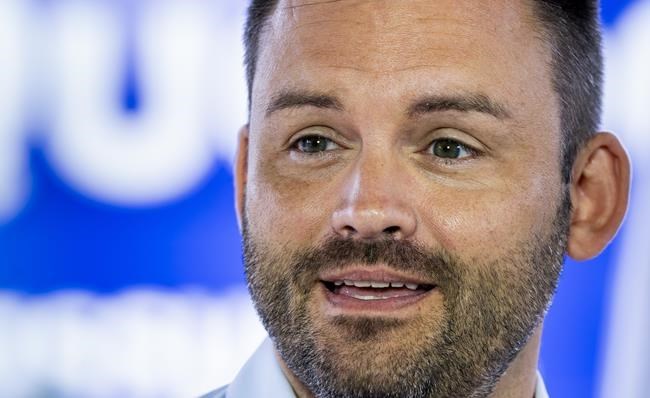
PQ leader Paul St-Pierre Plamondon responds to a question during a news conference in Montreal, on Tuesday, August 30, 2022. Security around Quebec's provincial party leaders appears to be high in the early days of the election campaign. THE CANADIAN PRESS/Paul Chiasson
August 30, 2022 - 2:28 PM
MONTREAL - Security around Quebec's provincial party leaders appears to be high in the early days of the election campaign, with one leader saying he's been given bulletproof vests to keep him safe.
When asked earlier this week about the large police and security presence surrounding all the main party leaders, Parti Québécois Leader Paul St-Pierre Plamondon blamed a charged political climate.
"They're doing excellent work, but we won’t hide that there's been a transformation of the political climate in Quebec," Plamondon said of the security team around him, adding, "I've been presented with bulletproof vests as well."
Plamondon said security is a sensitive topic for his party as it approaches the 10-year anniversary of a deadly election-night shooting that marred the victory party of former premier Pauline Marois. One man was killed and another was injured after a gunman opened fire outside the Metropolis concert hall as Marois was inside delivering her victory speech on Sept. 4, 2012.
Plamondon called on society at large to engage in respectful discussions and a "debate of ideas" during the campaign in order to foster a healthy political climate, while he acknowledged the role played by social media in amplifying tensions.
Quebec provincial police spokesman Nicolas Scholtus did not confirm whether security around the campaigning leaders was higher than in previous years, but he acknowledged that there was a rise in reports of harassment or threats directed at politicians during the COVID-19 pandemic.
Scholtus said Tuesday that there had been "some" reports of what he called "disparaging remarks" since the current campaign started, but he refused to give details. Provincial police, he added, are generally responsible for the security of indoor events and for guarding the leaders, adding that they work in combination with local police to manage outdoor events.
The questions around security came days after a video posted on Twitter appeared to show a man approaching and hurling profanities and insults at Deputy Prime Minister Chrystia Freeland as she boarded an elevator in Grande Prairie, Alta. The video drew widespread condemnation and prompted other politicians and public figures — especially women — to come forward and describe instances where they felt physically intimidated or verbally abused while out in public.
The Conservative Party of Quebec, meanwhile, reported late Monday that two of its volunteers had been threatened in separate incidents when putting up election posters over the weekend. In both cases, the alleged assailants first attacked the posters before turning their attention to the volunteers, according to a news release.
Leader Éric Duhaime said he was deeply upset to hear about what happened, adding that the volunteers were doing well. The Conservative news release said a suspect was arrested and released in relation to one event in Montreal, while it said the second suspect was still being sought by police in Sept-Îles, Que., in the northeast of the province.
When questioned on Tuesday, Quebec's other party leaders said they felt safe on the campaign trail and expressed confidence in the security teams surrounding them.
Liberal Leader Dominique Anglade said all party leaders receive the same level of security, adding that she hadn't thought "at all" about whether she was at greater risk as a Black woman.
Gabriel Nadeau-Dubois of Québec solidaire admitted the high level of security had been "an adjustment" for him personally. Nadeau-Dubois said he doesn't question the decisions made by his team, but he suggested it's time for a wider examination of root causes behind the rising political tensions that have made such measures necessary.
"Do we want to see in Quebec or Canada the kind of scenes we saw in the United States, for example, in recent years?" he said Tuesday.
"Those are serious issues that should be taken seriously."
Michael Kempa, an associate professor of criminology at the University of Ottawa, said politicians everywhere have been facing increased threats due to what he calls "the new reality of polarization and violence that's directed against public facing political leaders and other activists in our community.”
Kempa attributes this in part to the spread of U.S. political culture, where threat levels have been high for years, and also to the COVID-19 pandemic.
The pandemic, he said, led not only to government-enforced societal restrictions but also high stress levels, economic slowdowns and general uncertainty that served as “the perfect catalyst conditions for people in the most extreme corners of anti-state movements" to recruit.
While more visible security surrounding campaigning leaders is one solution, not every politician can be physically protected at all times. The real solution, he said, needs to come through proper intelligence that can identify threats and dismantle networks of people who plan acts of violence.
This report by The Canadian Press was first published Aug. 30, 2022.
— With files from Stéphane Rolland, Frederic Lacroix-Couture and Lia Lévesque
News from © The Canadian Press, 2022